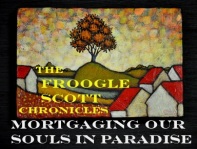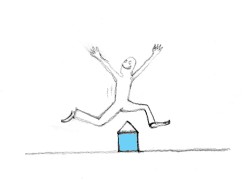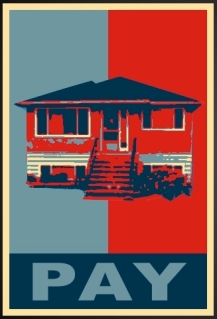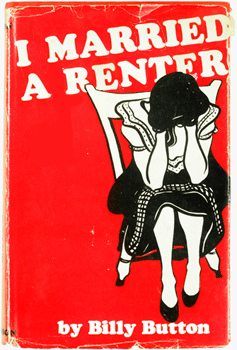Excerpts from ‘No solid basis for scary speculation’ by Jay Bryan, Montreal Gazette, 30 Dec 2010 –
“One of the biggest business stories of 2010 was one that never happened: the disastrous Canadian housing bubble and crash that never came to pass.
Of course, we know this now. Canada’s hot housing market has settled down without any serious slump in either prices or sales. It’s hard to find a reputable analyst who predicts anything other than mild fluctuations in housing over the coming year or two.” …
“The roots of bubble hysteria are understandable. After the terrible experience of the U.S., it made sense that many would be hypersensitive to any evidence that something equally disastrous could happen here. What’s not so understandable was that journalists working for some of the best newspapers in North America would give credence to such a hare-brained idea without finding any evidence that it was actually happening.” …
“As investors become more or less optimistic, the price of an asset -stocks, commodities or real estate -constantly moves up and down. Sometimes it’s too high and ripe for a fall -but that’s not a bubble. And unlike stocks or commodities, homes are an asset that’s resistant to big drops in value. Many owners are perfectly willing to wait if they don’t get a satisfactory price.”
It’s worth taking a look at the entire article.
Our comments:
Complacency comes before a fall.
Labeling concerns about a bubble in the Canadian RE market as “hare-brained” and “hysteria” are examples of bull hubris.
A home is by no means “an asset that’s resistant to big drops in value”.
How can anyone seriously write that while witnessing so many examples of housing prices plummeting around the globe?
It reminds one of the ‘scientist’ centuries ago writing that nothing heavier than air would ever be able to fly (while birds settled on his windowsill).
And folks, when “It’s hard to find a reputable analyst who predicts anything other than mild fluctuations in housing over the coming year or two” – Run for the hills! This kind of market complacency always, always, predicts coming volatility. The evidence is overwhelming that the moves will be to the downside.
-vreaa
[Some of Jay Bryan’s passages from this article will also be archived in the ‘What Bubble?’ and ‘Bull Hubris‘ sidebars.]
[Update 2 Jan 2011: For an excellent and comprehensive dissection of the Jay Bryan article, see ‘Who’s the ‘hare-brained’ one? More hot air from perma-bull Jay Bryan‘ by Ben at financialinsights.com.]

































“homes are an asset that’s resistant to big drops in value”
Jesus, the guy couldn’t bother to google a handful of articles from the US over the last few years? Tell people from almost anywhere in the Sun Belt that homes are resistent to big drops in value.
Yeah, stunning, eh?
By ‘reputable’ analyst he means those who have vested interest in prices remaining high. Others don’t qualify as being reputable. Laughable!
What scares me is this article was posted in the “Business” section and not “Opinion”.
I actually emailed this guy jbryan@montrealgazette.com and let him in on the existence of CMHC. I think if enough people email him about fact checking, he would re edit some parts. Hopefully he is just ignorant and not purposely misleading. Maybe try to be nice :p
“What’s not so understandable was that journalists working for some of the best newspapers in North America would give credence to such a hare-brained idea”
In my opinion, there are very few good newspapers in North America, and none in Canada. The New York Times and Wall Street Journal are good, and I haven’t found anything else I’d call good.
Investigative journalism is largely dead. Newspapers are now just pseudo-informative entertainment. That said, I’ve never paid for a newspaper, so I guess you get what you pay for.
Just chill people,
Anything outside of Greater Vancouver is affordable .
If Toronto prices is here, 99% of bears here will buy three condo.
ah, journalism school…
Absolute bullsh*t. This is *commentary* (and yellow commentary at that). It is NOT news. If you were Joe Average Canadian guy, a dude who never bothers investigating beyond what he’s given, and took this sort of cheerleading as The Truth (as most Canadians do), you’d see just one side. A side that ignores crippling debt, record-setting overvaluation, and a striking similarity to what happened in the US during the last four years. Both disgusting and irresponsible.
I don’t know why you are jumping all over Jay Bryan. There was no meltdown in the Canadian real estate market. What happened in the U.S. has nothing to do with Canada. Our fundamentals are different, our banking rules are different. There are no giant suburban developments boarded up and abandoned here. That is certainly not the case in Quebec and more specifically in Montreal, where Bryan follows the market quite closely. He makes his point thoughtfully and clearly. Disagree if you like, but he’s hardly guilty of “yellow journalism”.
Which lead to much more dizzing heights because of it. The market started to correct and then Flaherty and the BoC intervened to prevent that from happening. But that just delayed things (and made them worse).
You do know that the BoC gave the banks $75 billion in cold hard cash for their mortgage holdings, right? That’s akin to what TARP did in the US and on the same scale (actually slightly larger per capita). Different? Yes. Better? No.
You do know that the market first corrects and THEN the boarding up starts, not the other way around, right?
Don’t know about you, but if someone gives me advice I’d prefer the advice to have some relevance to the future, not just a status report of that very moment.
Mary -> Thanks for the comment.
What do you think of Jay Bryan’s statement: “Homes are an asset that’s resistant to big drops in value”?
Please let us know.
they jump on any piece that doesnt produce “end of the world” opinion.
God Help Us.
So many people, so much hubris, so much stupidity, venality and greed.
We worship Granite counters and sub zero fridges, and Vancouver has the highest rate of Hep C in the world.
People are SICK. When they find out what their hunk of plastic and glue is worth, they are going to be really upset.
Gee – I don’t get something for nothing! Who do I blame?
Not me! I am entitled, I live in “the Greatest City in the World”.
The whole thing is disturbing, and I think the shallow end of the gene poolhas taken over.
Take cover.
“…an asset that’s resistant to big drops in value. Many owners are perfectly willing to wait if they don’t get a satisfactory price.”…
Normally, I would go with a pithy/witty retort… but in this instance, I think the following will better serve to make the point… (and for those who are interested in such things – this is what hegemonic decline looks like)…
[UK Guardian] – Detroit in ruins / Yves Marchand and Romain Meffre’s extraordinary photographs documenting the dramatic decline of a major American city
http://tinyurl.com/273waoy
And now for some comic relief in the form of a cheeky afterthought….
[Reuters] – Ex-Treasury chief Paulson loses $1 million on DC home
http://tinyurl.com/2el36cl
Thanks for the links, Nemesis.
From the article discussing the $1 million loss: “The loss is not likely to have much impact on Paulson’s net worth, which was estimated to be as much as $700 million in 2008.”
So, a rounding error for this guy.
We’ve always maintained that ‘percentage of net worth in RE’ is a crucial variable, the importance of which is lost on many.
Say you’re a prospective buyer…
If a crash in Vancouver RE, with housing losing more than 50%, would only result in a relatively small percentage change in your net worth (say 10-12% drop), go ahead and buy.
If however, buying means that most, or all, or many times all, of your net worth is then in Vancouver RE, do not buy. A crash would wipe you out and have a profoundly detrimental effect on your life-long financial health.
We’ve discussed this in many places, a recent example HERE.
What is really interesting about the Paulson story is that a guy with $700m in net worth has a $3.25m home. In Vancouver, people with $1.5m net worth buy $3.25m homes, preferably with a mortgage helper in the basement.
Bryan says “homes are an asset that’s resistant to big drops in value” and then a few lines later “a bubble … occurs when … a large number of people begin to believe that prices can only go up, never down.” Saying prices are resistant to big drops is pretty darn close to saying prices can only go up. If Bryan’s views are mainstream, he’s simply confirmed that there *is* a bubble.
I think his thinking is representative of a generational “divide”.
He’s probably old enough to remember that his parents told him that housing will never lose value, and in their instance they were right. They bought the house to live in, they paid it off quickly and they didn’t use it as an ATM or “retirement nest egg” it was essentially the dream to have the house and “do your own thing” and people were willing to sacrifice and bleed for it.
Today though? Even people I know who claim they bought the house “as a home” seem to be obsessed about renters throwing money away and they are investing into their future.
In the past you first had the dream for the home, then you figured out how to finance it. Now it seems you look at it first and foremost as a (very safe) financial investment and don’t worry about the rest at all.
I wonder how many boomers will really be able to retire in the coming years and how many will need to try and hold onto their jobs in order to not end up on the street or in their children’s basement(s).